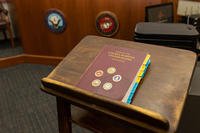CAMP LEJEUNE, N.C. -- After nine days of sometimes emotional witness testimony and a full day of closing statements, a seven-member military jury has begun deliberations in the case of a decorated Marine colonel accused of sexually assaulting a six-year-old girl, and, later the same year, assaulting an adult woman as she slept.
In the space of a single year, Col. Daniel Wilson was sent home ten days into a six-month military liaison post in Darwin, Australia, due to inappropriate behavior; fired as operations officer for II Marine Expeditionary Force in Camp Lejeune, N.C., amid allegations of child sex assault; then remanded to the base brig to await trial as new accusations of sex assault surfaced.
The 36-year Marine and Bronze Star recipient now faces the prospect of a lengthy prison sentence if he is found guilty of the most serious allegations. But Wilson and his defense team maintain he is innocent on all counts, saying his misconduct in Australia was not criminal and his accusers in the alleged sex assault incidents were unreliable, with reasonable doubt remaining that the senior officer did not commit the assaults.
Accused of assaulting a child
In the case of the six-year-old, Wilson is accused of touching her and penetrating her with his fingers on at least one occasion, while her family was spending time with Wilson and his wife at the Wilsons’ base home. According to testimony and attorneys’ statements, the Wilsons became close with the family -- a Marine major, his wife, and three daughters -- after the family moved to Lejeune from Okinawa early last year.
The families spent time together frequently during a two-week period in late June and early July 2016, often on evenings in which Wilson consumed multiple straight liquor drinks. The six-year-old’s parents testified that Wilson spent a significant portion of his time with her and paid her special attention, finding himself alone in a room with her unsupervised on multiple occasions. On July 13, 2016, the girl told her mother that Wilson had touched her, a disclosure that precipitated a Naval Criminal Investigative Service investigation and the eventual charges.
With no conclusive DNA evidence, medical evidence of penetration, or an eyewitness to the alleged assault, both the prosecution and defense relied on expert witnesses to speak to the reliability of a young child’s testimony and whether it had been tainted by outside factors and pressures, such as how her mother had pressed her about whether she was touched on the initial night of disclosure and how child advocacy center staff had interviewed her the following day.
“Did [the 6-year-old girl] lie? I don’t know, and the problem is, neither does anyone else,” Wilson’s civilian attorney Phil Stackhouse said in a closing argument that stretched nearly three hours and gamed out numerous possibilities for the disclosure the child had made.
Among these were the possibility she was inadvertently pushed toward such a statement by her mother, accusing Wilson when, in fact, someone else had touched her, or mistaking an innocent touch from Wilson -- “scooting” her back on his knee -- for a violation.
Stackhouse pointed out that the child had twice denied to her mother being touched by Wilson on the evening of disclosure before she said he had, and provided details about the alleged assault.
In a closing statement Friday, lead prosecution attorney Lt. Col. John Stephens noted that a government witness, Dr. Mark Everson, an expert on childhood trauma at the University of North Carolina, had testified that six-year-olds are remarkably resilient to suggestion, or the planting of false memories.
He also noted testimony from the girl’s grandmother and parents that her behavior has changed in marked ways since the alleged assault. They said she continued to have mood swings, sometimes hiding and needing to be lovingly coaxed out and comforted by a parent; and appeared to be more sensitive to undressing in front of others.
In their testimony, the girl’s father and mother both described instances of bizarre, albeit non-criminal, behavior from Wilson when he had been drinking. The mother said that on one evening Wilson approached her from behind and put her in a headlock, which she fought her way out of. In another instance, she said he had asked one of her young daughters to bring him a refill on his whiskey, a request that she said disgusted her.
Another alleged assault
The adult accuser became close friends with Wilson and his wife in fall 2016, after the prior accusations had surfaced. Wilson is alleged to have twice jumped on top of her and penetrated her with his fingers on the same evening in December, after a night of heavy drinking while all three were on a trip to Beaufort, S.C., and staying in the same military hotel suite.
Stackhouse raised questions about the veracity of the woman’s testimony, noting that she was heavily medicated after recent surgery, had testified to the dreamlike nature of her recollections, and did not immediately make an assault report, continuing to remain friendly with the Wilsons until early January.
Moreover, he said, certain elements of the accusation seemed unbelievable, such as her account that Wilson’s wife, Susan, fended him off of her that night by hitting him with a frying pan.
Stephens, however, contested that evidence of when Wilson returned to the room corroborated the woman’s story, and it made little sense for her to lie about certain specifics, such as citing Susan Wilson as an eyewitness to the assault.
Neither of the Wilsons testified during the trial.
“You could just conclude that Col. Wilson got drunk and did some stupid things,” Stephens said, summarizing both assault allegations. “The simplest explanation, the one with the least amount of variables, is the one the members should find is true.”
Conduct unbecoming?
Wilson also faces charges of conduct unbecoming an officer for his behavior in Australia. Both sides agree that Wilson made a crude sexual comment to another colonel’s wife after a night of drinking; asked a Marine captain to send him a scantily-clad photo of the captain’s wife, which Wilson then shared with his Australian counterpart in Darwin; later asked the same captain for a pair of his wife’s underwear; and caused a commotion in his new office by sending a message from a female colleague’s unattended work email account, asking the Australian officer out to dinner.
Stackhouse said the incidents represented inappropriate behavior, jokes in bad taste, and even fraternization with the captain in question, but did not rise to the level of a moral or character flaw implied in the conduct unbecoming charge.
Stephens, however, said the context of the behavior and the sensitive international relationship made Wilson’s actions more troubling and serious.
“If this isn’t [conduct unbecoming], there’s probably no words I can give to convince you,” he said. “We ask that the panel not put its imprimatur on this behavior.”
It’s extremely rare for such a senior military officer to face charges of this severity. In his closing statement, Stackhouse urged the jury to remember:
“This is Col. Wilson’s, without any doubt, the most important day of his life,” Stackhouse said. “There’s a lot of things that creep into people when they’re making decisions. Emotions … assumptions … guessing. I’m going to ask you and plead with you to go back in that room and find Col. Wilson not guilty.”
Jury deliberations will continue into Saturday.
-- Hope Hodge Seck can be reached at hope.seck@military.com. Follow her on Twitter at @HopeSeck.

























